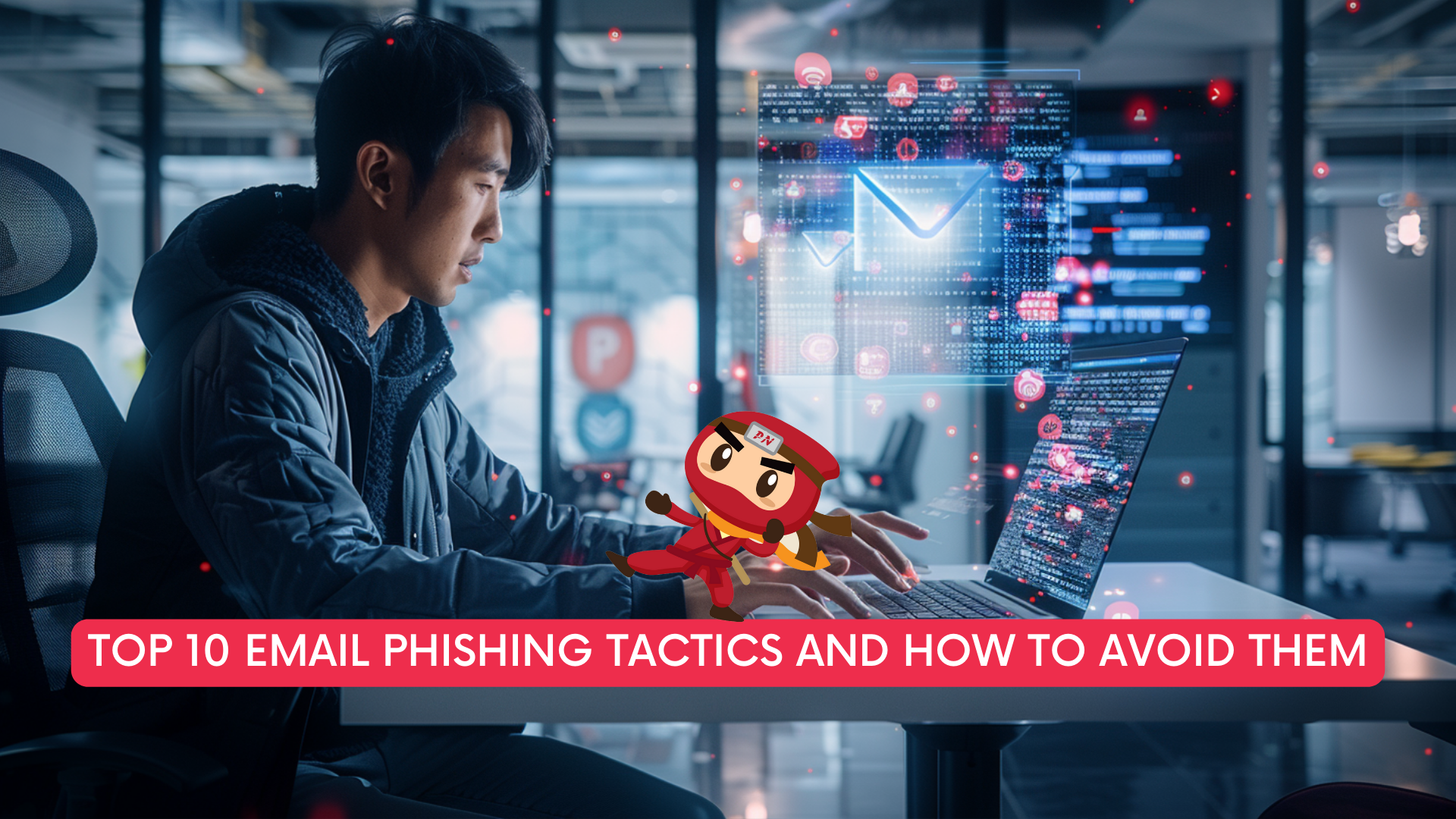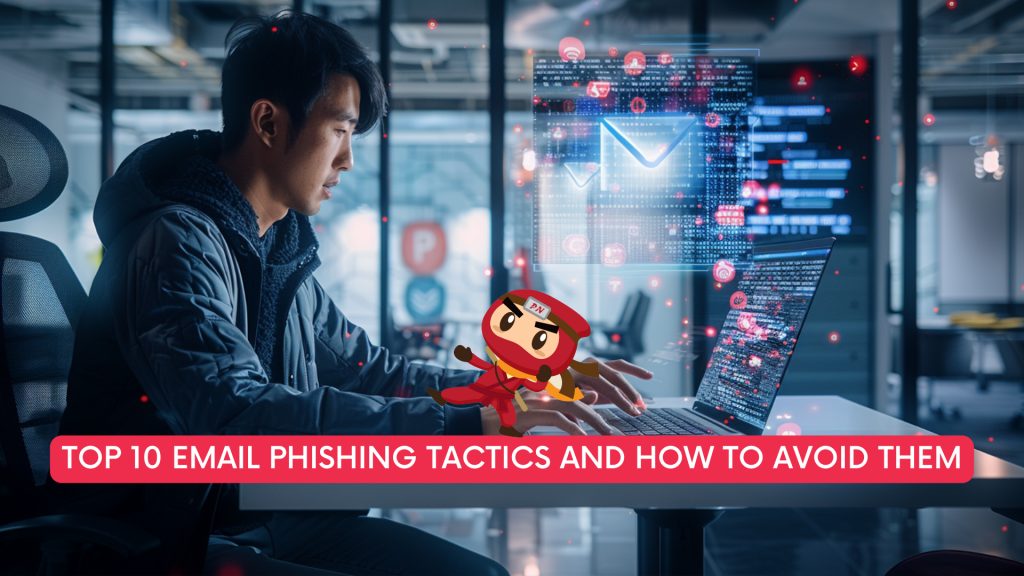KEEP IN TOUCH
Subscribe to our mailing list to get free tips on Data Protection and Cybersecurity updates weekly!







Email phishing is one of the most prevalent and dangerous forms of cybercrime. Cybercriminals use deceptive emails to steal sensitive information, install malware, or commit fraud. Understanding the most common phishing tactics and how to avoid them is crucial for protecting yourself and your personal information. Here are the top 10 email phishing tactics and practical tips to avoid falling victim to these scams.
Tactic: Phishers often create email addresses that closely resemble those of legitimate companies. These addresses may include slight misspellings or additional characters that can easily go unnoticed.
How to Avoid: Carefully inspect the sender’s email address for any discrepancies. Legitimate companies will not send emails from generic domains like Gmail or Yahoo. If unsure, contact the company directly using contact information from their official website.
Tactic: Phishing emails often contain links to fake websites designed to look like legitimate ones. These websites are used to steal login credentials and personal information.
How to Avoid: Before clicking on any link, hover over it to see the actual URL. If the URL looks suspicious or does not match the official website’s address, do not click on it. Always access websites by typing the URL directly into your browser.
Tactic: Many phishing emails create a sense of urgency or fear, suggesting that immediate action is required to prevent negative consequences, such as account suspension or legal action.
How to Avoid: Be skeptical of any email that demands immediate action or threatens dire consequences. Legitimate companies will not pressure you in this manner. Take a moment to verify the information through other channels before responding.
Tactic: Phishers often include unsolicited attachments in emails, which may contain malware or viruses designed to compromise your computer or steal information.
How to Avoid: Never open attachments from unknown or unexpected sources. Even if the email appears to come from a known contact, verify its authenticity before downloading any attachments.

Tactic: Spear phishing targets specific individuals or organizations by using personalized information to appear more convincing. These emails often reference details that make the email seem legitimate.
How to Avoid: Be cautious of emails that include personal information and ask for sensitive data or request unusual actions. Verify the authenticity of such emails by contacting the sender through a trusted method.
Tactic: Phishing emails may contain links embedded in the text, directing you to fraudulent websites that look identical to legitimate ones.
How to Avoid: Avoid clicking on links in unsolicited emails. Instead, navigate to the official website by typing the URL directly into your browser or using a bookmark you trust.
Tactic: In clone phishing, attackers create an almost identical copy of a legitimate email that was previously sent to you. They then replace the links or attachments with malicious ones.
How to Avoid: Always verify the source of an email, even if it appears to be a follow-up to a previous legitimate email. Check for any inconsistencies or signs of tampering.
Tactic: Phishing attacks are not limited to emails. Vishing (voice phishing) and smishing (SMS phishing) involve phone calls or text messages that mimic legitimate communications to extract personal information.
How to Avoid: Be wary of unsolicited phone calls or text messages requesting personal information. Verify the identity of the caller or sender by contacting the organization directly using official contact information.
Tactic: Cybercriminals use social media platforms to gather personal information and send phishing messages or links that appear to come from friends or trusted contacts.
How to Avoid: Be cautious about the information you share on social media. If you receive a suspicious message or link from a friend, verify its legitimacy by contacting them through another communication method.
Tactic: BEC involves phishing emails that appear to come from a company executive or business partner, requesting sensitive information, financial transactions, or access to company systems.
How to Avoid: Verify any unusual or urgent requests from executives or business partners by contacting them directly using known contact information. Implement verification protocols for financial transactions and sensitive information requests.
In addition to recognizing specific phishing tactics, adopting general best practices can further protect you from phishing scams:

If you suspect you have fallen victim to a phishing scam, it’s crucial to act quickly:
Email phishing is a significant threat, but by understanding the tactics used by cybercriminals and knowing how to avoid them, you can protect yourself and your sensitive information. Stay vigilant, keep informed, and adopt proactive measures to safeguard your digital life. By doing so, you can reduce the risk of falling victim to phishing attacks and contribute to a safer online environment for everyone.
One of the best ways to combat cybersecurity threats in today’s modern time is by conducting regular penetration testing. Remember, if you suffered a data breach under the PDPA, you could be liable for up to a financial penalty of S$1,000,000. Luckily, Privacy Ninja is here to help you check if there are any vulnerabilities in your system.
Privacy Ninja can assist you in this endeavor by providing penetration testing services, which check if your organisation has vulnerabilities that could be exploited by bad actors, whether in your email environment or your organisation in general.
Privacy Ninja has years of experience in cybersecurity and offers quality services, as evidenced by the feedback from its clients as the years go by. It is a licensed VAPT provider (Penetration Testing Service License No. CS/PTS/C-2022-0128) and has the best team of professionals who are experts in their field, leaving no stone unturned in checking for any vulnerabilities in your system or organisation as a whole.
Moreover, we work hand in hand with our clients and deliver results on time, especially when there is a hint of vulnerabilities that need to be checked. Most importantly, Privacy Ninja has a Price Beat Guarantee, which makes the service even more affordable but will not leave the quality of services each client deserves.
What are you waiting for? Choose Privacy Ninja now as your penetration testing partner and experience the quality of services brought to you by cybersecurity experts at an affordable price, Price Beat Guarantee!